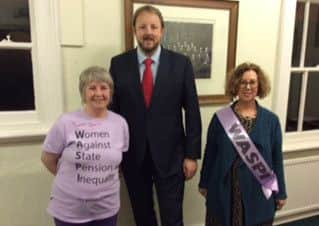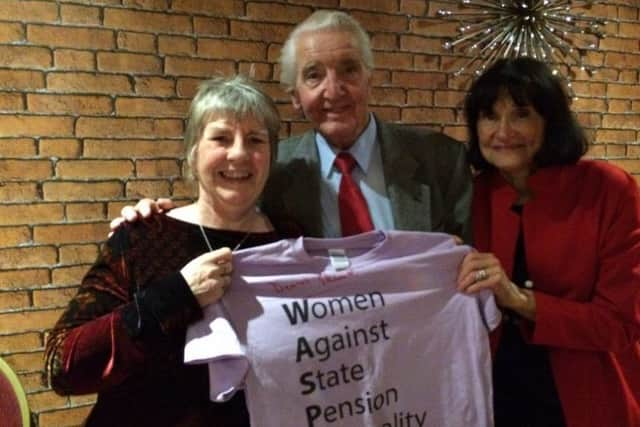Derbyshire women fight for pension '˜justice'


Women Against State Pension Insecurity (WASPI) say women born in the 1950s have been disadvantaged by successive governments because of the way changes to their state pension age were made and the lack of communication with the people affected.
Nationally, the group have managed to get over 130,000 signatures on a petition and as a result managed to secure a debate in parliament which took place on Monday.
Advertisement
Hide AdAdvertisement
Hide AdOrganiser of the Derbyshire campaign, Tricia Clough, from Chesterfield, said: “We’ve got women having to return to work or put on schemes like job seekers’ allowance with little hope of getting a job.


“Some have no income at all and are relying on friends, some are using their savings and some have even sold their homes.”
The 1995 Pension Act announced the Government’s intention to equalise the state pension ages between men and women but the campaign say the women affected were not informed about this for another 14 years.
Then, in 2011, when the changes began to be introduced, some women were given as little as one year’s notice that they wouldn’t get their pension for another six years.
Advertisement
Hide AdAdvertisement
Hide Ad“Some women are still finding out and families are losing up to £35,000 from their pension as a result,” said Tricia.


“What we are calling for is fair transitional arrangements for the group of women born in the 1950s who are affected by this.”
The campaign has received backing from local MPs Toby Perkins and Dennis Skinner, and Frank Field MP, chair of the House of Commons Work and Pension Select Committee said the group of women affected had been ‘grotesquely disadvantaged’ and recommended ‘immediate changes’ to state pension communication from the department.
For their part, the Government say the changes were widely covered in the press and if they agreed to the changes the group are demanding then it would just mean another, younger group would be disadvantaged instead.
Advertisement
Hide AdAdvertisement
Hide AdThe group hope, however, that the debate and the blanket coverage they have received in newspapers, radio and television this week will make the government think again.


Another, full debate in the House of Commons will take place on the issue later this year.
Case Study - Linda Marper, Chesterfield
My story is as follows.
Just under three years ago I was made redundant. As I was close to 60 I was not unduly concerned as I had a fairly good redundancy package and I thought that on my 60th birthday in the October I would get my state pension.


It was only when I was shopping in Sainsburys and having a chat with the lady serving me who told me that I would not be getting my pension at 60.
Advertisement
Hide AdAdvertisement
Hide AdI came home and googled information. I was shocked to read that not only would I not be getting my pension as I had thought, I would actually not get it until July 2018. I was desolate.
I sat and thought of the injustice. I had never received any notification of not just the first change but also the second.
I reflected that I had started work when I was 15. Pay back in the late 60’s for women was poor. When I was pregnant I was asked to leave my job. Companies in those days didn’t offer maternity leave or maternity pay. Pension advice in those days was unheard of.
As the years rolled on I did make progress in my career and managed to put money away into a private pension fund, for a while I contracted out.
Advertisement
Hide AdAdvertisement
Hide AdFollowing my redundancy I found part time work as an administrator which lasted for a year. Earlier this year the only work I could find was low paid on a zero contract as a support worker. In December last year I had to take a break as I had developed severe back pain which I am currently receiving treatment for.


There are no jobs for people of my age.
Quite how I will get by until July 2018 I really don’t know. I feel depressed all the time.
I wish the government would re think the situation they have put me and thousands of others in.
Case Study - Diane Jewkes, Pleasley
I was born on the 10th may 1954. My pension age has changed 3 times, so no wonder I am confused.
Originally I was to receive my state pension at 60.
Advertisement
Hide AdAdvertisement
Hide AdThen they were equalising the male/female pension age and I was told my pension age was 64.
Then I read that they were extending the pension age and I would get my pension at 66.
Then they were slowing the acceleration (albeit not by much) and I would get my pension at 65 and 8 months....on January 6th 2020.
The actual acceleration is so fast that had I been born 5 days earlier I would receive my pension 2 months earlier.
Advertisement
Hide AdAdvertisement
Hide AdA colleague who is 16 months older than me received her pension in September 2015.....that’s a whole 4 years and 4 months earlier than me or £21k+.
The government claim that I will be compensated with a larger state pension, but I have been contracted out for a few years (14) which paid for a small NHS pension, this will mean that I won’t receive the full amount of state pension so won’t be compensated in any way.
To me this is blatantly unfair. Yes I accept that equalisation was needed, but that the changes are confusing and the speed of the acceleration is unfair and discriminates against women born in 1954 in particular.
Personally for me this means I have to continue working, I work as a qualified nurse in charge of a 40 bedded nursing home on night duty. The work is very heavy, we are very often short staffed and it’s busy and stressful.
Advertisement
Hide AdAdvertisement
Hide AdI have arthritis starting in my hips and had poor health last summer (off 4 months) with acute pancreatitis which was followed by acute cholecystitis resulting in a complicated emergency cholecystectomy, I followed this with a DVT (deep vein thrombosis) and a pulmonary embolism. I’m still on warfarin. I am able to work part time because of my NHS pension but I really could do with retiring. My sister died at 63 and I think I could well not see my retirement.
My husband who is the same age as me struggles to work due to his arthritis and gout but we can’t afford to retire.
If you have a role which is stressful and/or heavy work then working to almost 66 is very difficult. The government says that if you can’t work then you can get sickness benefit, but this only applies for 6 months and then you face an assessment to see what you can do and likely to get nothing, also ESA is means tested.....so again nothing.